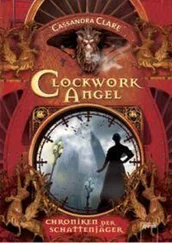Janis reads the small, too dark print of a poor photocopy, she looks at the photograph that doesn’t look like a child’s face—just a Rorschach of black and white planes; it’s such a bad copy of the picture. Could be a little boy with black pools where his eyes should have been.
She reads the articles—they all say the same thing. An adopted child beaten to death by his parents in Switzerland. Countries and names change from one article to the next, but the story is the same—beaten, dismembered, thrown out of windows, moving vehicles, off bridges. She flips through the clippings, face after face after face in severe black and white. Janis cries then, not for them but for Helen.
* * *
The monster growls so softly it sounds like a purr. Its claws tap on the floorboards like castanets. Helen sits on her bed hugging the bruised knees to her chest.
The doctor did not seem to believe the story of the monster, and instead seemed to think that her mom and dad were the ones who hurt Helen. He even said that if they beat her, she should tell him that now and the police would find her new parents. While the proposal seemed tempting, Helen decided that lying was still wrong. The monster growls louder, reminding her of her mistake.
Helen cannot sleep and she thinks back, to what she can remember of the orphanage—so much of it is fading from her memory already. But the monsters she remembers, their long shadows stretching across the chipping walls. The nannies tell her that these are not shadows, just stains from the age-old plumbing leaks. Just blemishes of an unknown origin. They rumble in the pipes, they spread in the puddles of gray light that move across the floor of the classroom as the day wears on. They hide under desks and chairs in the common room, they follow the children outside to the swings and the monkey bars.
The monsters look out of the eyes of the parents who come to take away children; they all speak unfamiliar languages. They look out of the eyes of the nannies and especially the older boys, all teeth and clawed fingers. Helen avoided them and kept her head down, dreading the day she would be tall enough to push against the lockers.
She dangles her foot off the bed and pulls it back up right away, teasing the monster. She hears it lunge and miss and dig its claws into the floorboards. Its breathing is heavy now, upset. If she weren’t so afraid, she would’ve descended to the floor and let the monster devour her—every bone, every morsel—and lick the floor clean of blood with its red tongue, rough enough to strip the paint and varnish off wood. Her parents would find no trace of her, as if she simply vanished from the world.
It would be a good death, she thinks, not at all like the girl in the orphanage, found hanging off the curtain rod, her red tights wrapped around her neck. Helen remembers her purple tongue teasing between white sharp teeth; she remembers the missing incisor and the swollen tissue squeezing through the gap. Or like the boy who snuck off to go swimming in the lake a few kilometers away. They brought him back, blue and naked and wet like a creature from a horror movie. Like a monster.
She dangles the edge of the blanket and hears the tearing of fabric. She pulls back the long twisting shreds. She hears the footfalls on the staircase, and hides the torn blanket from sight. She pretends to sleep as the door squeals open and Janis stands in the doorway. Helen feels her worried look with the back of her neck.
* * *
“This is ridiculous,” Tom says, and turns off the TV to illustrate his seriousness on the matter. “They think that we are hurting her?”
Janis nods and shows him the clippings. They do not say it out loud, but they both are thinking the same thing: these children are impossible, they are messed up and they cannot be fixed. They do not speak English, and yet they demand, they want things, they require tutors and psychiatrists, and their medical bills are piling up. The orphanages have the secret policy of adopting the most damaged children abroad, and Janis cannot decide if it is out of kindness, trying to get them help they cannot get at home, or cynicism, getting rid of the defectives and the unwanted.
She thinks of the people in the adoption agency and the orphanage staff, and she does not know if those people even know their own motives. She only knows that the doctors at the orphanage give all the children a clean bill of health, afraid to spook the potential parents. In any case, they find out soon enough.
Helen came with a heart murmur and bed wetting; the latter does not seem too bad compared to the congenital heart defect that is too late to fix. But even that fades in comparison to her acting out and scratching, to her fears, to her reluctance to let them touch her. Even that fades in comparison to the unexplained bruises and cuts.
“I think she did it to herself,” Tom says. “The doctors checked her out before—there wasn’t a problem then. Maybe she fell or banged against something in the playground?”
Janis shakes her head. “I don’t know. But those bruises… they look like fingerprints. Adult fingerprints, and nail scratches.” She draws a deep breath, dreading the question she has to ask. “Tom…. You wouldn’t…”
He looks at her open-mouthed, not indignant, just surprised. “No. Of course not.” Of course not, Janis scolds herself. How could she even think that?
He stares at her, clears his throat. “Janis, we really need to talk.”
She knows what it’s about—the child is a problem, like the children in the clippings. The problem. They never fought before, never suspected one another of anything unsavory. They used to have leisure and spare cash, they never used to argue like that. Janis just cannot bear to think about admitting defeat, to tolerate the smug I-told-you-sos from family and friends. “It’s different when it’s your own,” they will say. “What did you expect? She’s too old, too mixed up. It’s not the same as having your own baby. It’s sad, but you can’t save them, Janis, you can’t save them all.”
She thought she could save just one, but even that is apparently too much for them.
“Yes,” she says out loud. “We need to talk. Let me just check on her.”
* * *
Helen squeezes her eyes shut and waits for the woman to close the door, cutting off the thick slab of light reaching in from the hallway. The light makes the monster retreat into its den somewhere between the bed and the floorboards, where its eyes glow with quiet red ferocity in the darkness. She wants to ask the woman—Janis, mom—to leave the door open, to put the lights on, but she cannot, and she cries silently, her salty tears sliding down her cheek and into her hair, soaking into the pillow.
The woman does not leave. Instead she comes in and sits on the bed, the white texture of her cable-knit sweater exaggerated by the light from the hallway and darkness inside the room. It is cold tonight—the cold has finally caught up with Helen. It chased her across the unfathomable chasm of the ocean and nine hours of flying through the air over the stationary clouds. The autumn is here now, and there are no more moths fluttering in the curtains.
Helen peeks between the tear-soaked eyelashes, and the beam of light twinkles and breaks into a myriad of tiny stars. The woman looks back at Helen but does not smile like she usually does when their eyes meet. Instead she sighs and strokes Helen’s hair. She feels the moisture under her fingertips, and she looks like she’s about to cry herself.
Helen considers opening her eyes completely but decides against it and squeezes them shut, feigning sleep. If she looks at her new mom directly, she will start talking, and then Helen would cry in earnest at her inability to understand, to explain about the monsters and shadows and fear.
Читать дальше












